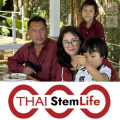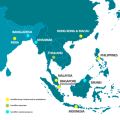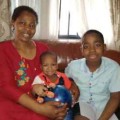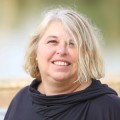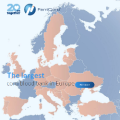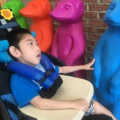You are here
News
2023
Feb 2023 Romania, a small country located in southeastern Europe, is one of the most active EU countries for cord blood banking. There are ten private banks, but no public bank, offering cord blood storage to parents in Romania. There is currently an active clinical trial in Romania which treats Autism Spectrum Disorder with the child's own cord blood. This trial has led to the discovery of a biomarker for ASD, and the trial has been extended due to good preliminary results.
Feb 2023 Matinn was conceived with the help of PGD-HLA assisted reproduction so that he could be a transplant donor for his brother Marjo. The Jetanin Group partnership of Superior ART and THAI StemLife have performed 15 successful PGD-HLA transplants to cure Thalassemia, the 2nd largest number worldwide from a single center.
Jan 2023 Cordlife Group is Asia's largest network of cord blood banks, with full laboratories in seven countries. Cordlife operates some of the most highly accredited cord blood banks in Asia, and they have released cord blood for therapies at 18 healthcare institutions in nine countries.
Jan 2023 Kamsiyochukwu is from Nigeria and he suffered from the hereditary blood disorder Sickle Cell Anaemia. He needed a stem cell transplant to cure his disease, but he did not have a match in the public registries of donors. He was saved by a cord blood transplant from his baby brother. His mother gives thanks to the cord blood bank that made this transplant possible. The bank also paid towards their medical costs through an insurance program.
2022
Dec 2022 Eric traveled to Thailand for MSC therapy to help him recover from a traumatic brain injury. He had previously undergone months of testing and conventional therapy in the United States, but felt that his recovery was not complete. At the hospital in Thailand, the MSC were injected both into his spine and into his bloodstream. The MSC came from a laboratory that had AABB somatic cell accreditation. Eric feels that his recovery is now complete and he can once again devote himself to the charity he founded.
Dec 2022 The answer is NO. Due to growing awareness of the value of donated placentas, parents frequently ask questions about selling their placenta. The purpose of this article is to explain why you can’t sell a placenta.
Nov 2022 Little Gauri is the second child saved by a cord blood transplant from the LifeCell Community Bank. Like thousands of children in India, Gauri suffers from Thalassemia Major, but did not have a matching stem cell donor in her family. With the birth of her baby sibling, Gauri's parents signed up to bank cord blood in the LifeCell Community Bank. Thanks to the inventory shared by members of the community, Gauri received a matching cord blood transplant from an unrelated donor.
Nov 2022 Michal is a mother of three children on the autism spectrum. She has created a website that gives parents a how to guide for seeking cell therapy for autism.
Oct 2022 FamiCord Group is a network of family banking companies and 15 laboratories that together hold 50% of the cord blood banking market in Europe. In this interview we learn how FamiCord built this dominance and what trends they see for the future of biobanking and cell therapy in Europe.
Oct 2022 This story tells the experiences of a family from Japan whose son has HIE from a birth injury. They banked his younger sister's umbilical cord blood at the StemCell Institute. Thanks to the banked sibling cord blood, the family was able to travel to Duke for their son to receive cell therapy through the Duke Expanded Access program (EAP).


